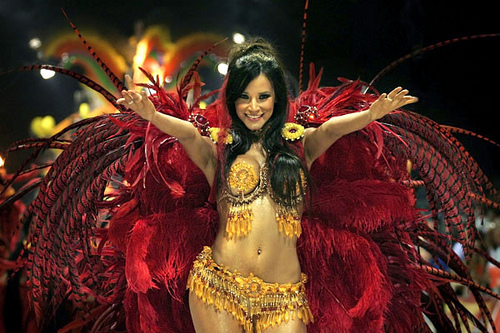There are a lot of holidays that celebrate the country or a
national event in Argentine history. There are of course holidays and
celebrations that reflect the large Roman Catholic population as well.
January 1. New
Years Day. There are several
traditions (some ordinary, some not) that take place. Most people will gather
together for a late meal with friends and family. Traditional foods include pan
dulce (a sweet bread) and turron (a type of cake of sorts). Around midnight, everyone will go
outside to bring in the New Year. Fireworks displays light up the night, and
people will stay out and dance with live music, eat, and celebrate practically
up until dawn. Many people will attend church services on New Years Day itself.
(I have no idea how; I’d probably fall asleep if I attended after staying up
all night.) Some people will run
around the house with a suitcase to hope for more travels during the coming
year, whereas others will eat beans to ensure they stay on at their job or with
hopes of a better one. Many others will go swimming, either in a pool, river,
or lake. (This isn’t a Polar Bear
Club sort of thing; remember, in Argentina it’s summertime in January.)
February 20-21.
Carnival. (This is a
floating holiday.) The traditions of Carnival in Argentina are similar to those
that we see in Rio de Janeiro. Many cities throughout Argentina hold their own
Carnival traditions, but two of the largest are in Buenos Aires and in the city
of Gualeguaychu. There are
presentations of many different samba schools with up to 700 dancers all
dressed in brightly decorated costumes.
March 24. Day
of Remembrance for Truth and Justice.
This is a day of remembrance for the victims of what’s called The Dirty War, where thousands of students, left-wing activists, journalists, trade
unionists and sympathizers were killed.
It’s more specifically in remembrance of the coup d’état in 1976 when
the National Reorganization Process took power.
April 2. Day of
the veterans and the fallen in the Malvinas War. This day is to commemorate the day in 1982 when Argentina
fought against the British to gain control of the Falkland Islands. There are still disputes with them over
ownership.
April 8.
Easter. (This is a floating
holiday.) Many towns and cities
will have reenactments of the Passion during this time. The whole week following Easter Sunday
is a week of celebrations. Many
people take this two-week period off of work. I would just be happy with taking the Monday afterwards off.
May 1. Labor Day.
There have been a lot of labor issues in Argentina’s history, and with a
fairly high unemployment rate, it’s still a pressing issue today. There are initiatives to try to make
the work day only 6 hours, but most people probably work closer to 10 hours a
day on average.
May 25. Day of
the First National Government.
It’s a day commemorating the May Revolution (which began the Argentine
War for Independence) and the Primera Junta (the First Assembly).
June 20.
National Flag Day. A day to
celebrate the Argentine flag. There
are three horizontal bands: light blue on top, white in the middle, light blue
on the bottom. The light blue represents the skies, and the white represents
the snow-topped Andes. In the middle of the white band is a yellow sun with a
face, known as the Sun of May. Its
facial features are those that are from Inti, the Incan god of the sun.
July 9.
Independence Day. A day
celebrating Argentina’s independence from Spain. Many people display flags and
have cookouts with their families and friends.
August 17.
Anniversary of the death of General José de San Martín. He was one of
the main tacticians in leading Argentina to independence. He’s considered a
national hero.
October 12. Day
of Respect for Cultural Diversity.
Almost the same as Columbus Day in the United States. It’s a day to
celebrate Christopher Columbus’ accomplishments and bringing “civilization” to
the Americas.
November 20.
Day of National Sovereignty.
It’s a day to commemorate the Battle of Vuelta de Obligado, a battle
where a small group of Argentine soldiers fought against the Anglo-French navy
that entered the Paraná River. Even though it ended with the Argentines loosing
the battle, it’s still considered a major national historical event.
December 8. Immaculate
Conception Day. This is a day for Christians (mostly Catholics) that celebrates
their belief in the concept that Mary had conceived as a virgin. Many people
will attend church services on this day.
December 25. Christmas Day. Many Argentines celebrate Christmas in the stereotypical
ways celebrated around the world. They decorate their homes with lights, as
well as having a Christmas tree (although it doesn’t necessarily have to be an
evergreen tree). Gifts are exchanged with family and friends. Even though
Christmas falls in the summer in Argentina, they do have many of the
traditional foods found in Europe or America, such as roast pork or turkey, but
they also include a lot of fresh fruits and cold desserts as well. A popular
tradition is to visit the beaches during this time.
Up next: art and literature
Up next: art and literature
Resources:
Wikipedia: “Public holidays in Argentina” “Day of
Remembrance for Truth and Justice” “Dirty War” “First National Government” “General
José de San Martín” “Day of
National Sovereignty”
Various holidays: http://www.the-allure-of-argentina.com/argentinatraditions.html
CIA World Factbook: Argentina
Immaculate Conception Day: http://www.timeanddate.com/holidays/common/immaculate-conception





No comments:
Post a Comment